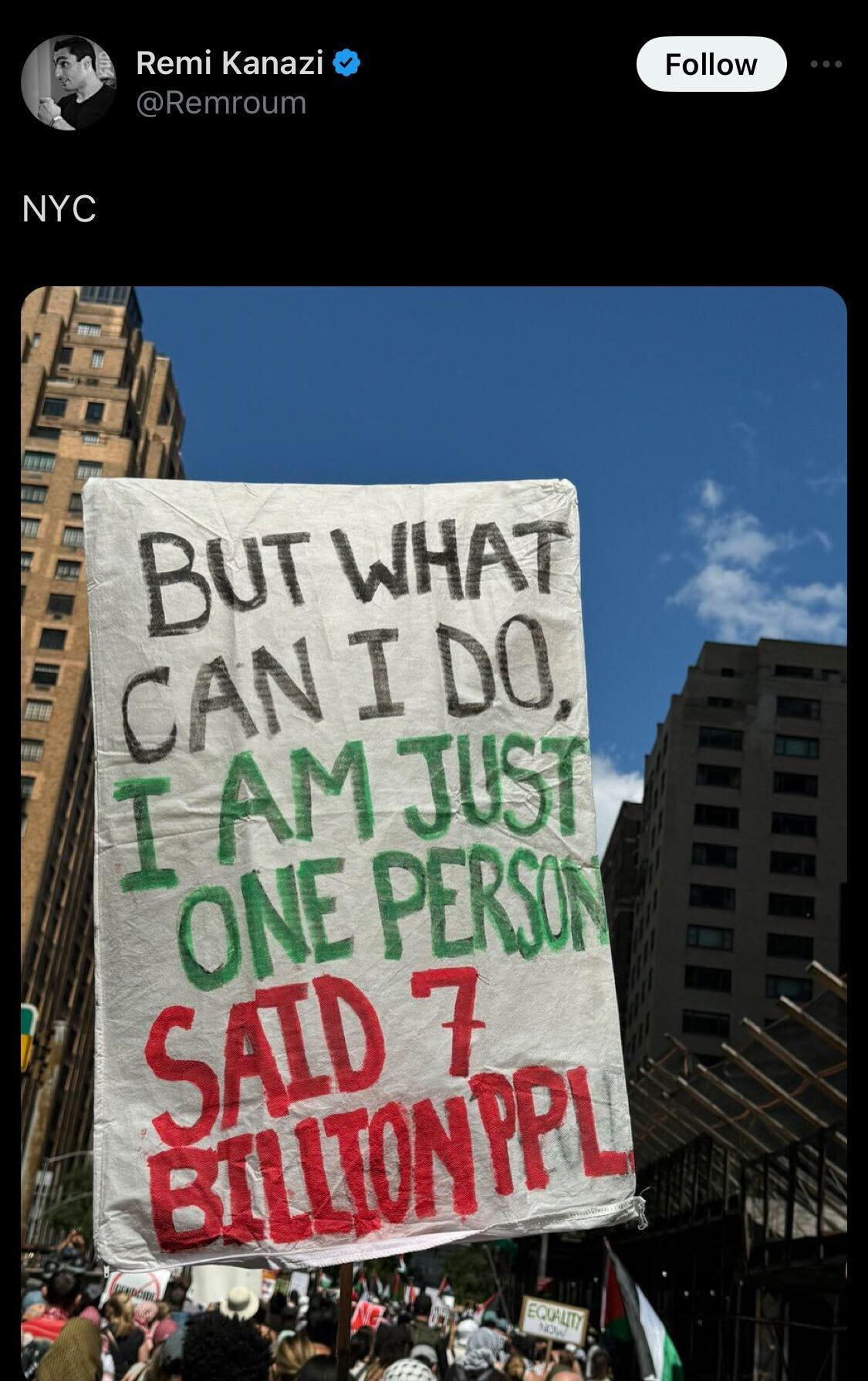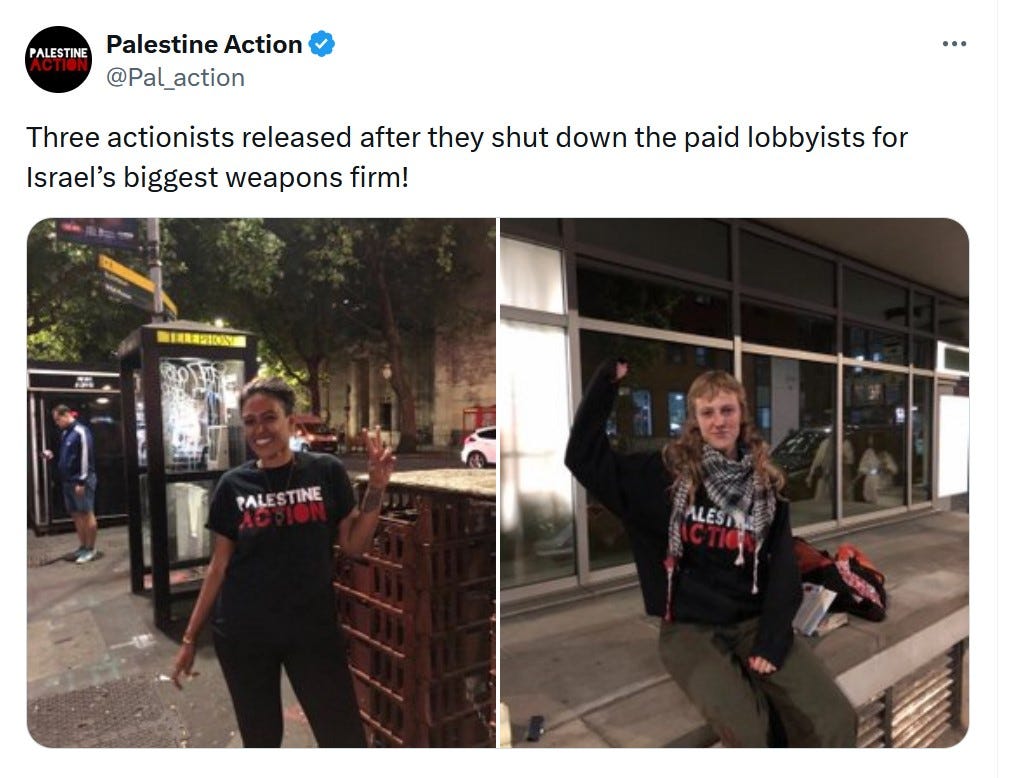Opposition means Action
We must act to free Palestine and to free ourselves

I haven’t been able to stop thinking about a simple, profound shift in thinking I heard the other day. At the end of the recent Socialism 2024 conference, on the final panel, Palestinian feminist, scholar, and organizer Nada Elia pointed to new polling that shows 61% of Americans opposing weapons aid to Israel’s assault in Gaza. To me, and to most people who support Palestinian liberation, the polling appears to be a good sign. But Professor Elia flipped my thinking upside-down in 30 seconds. She said these numbers are bullshit, because the our understanding of the question is bullshit. Opposing something in any meaningful way does not simply mean expressing an opinion; opposition is not a state of mind, it’s a verb. And if 61% of Americans were in active opposition, were taking action to oppose Israel’s genocide and the U.S. government’s arming and funding of the genocide, it would end tomorrow.
Her words stunned me. The shift in how we conceive of opposition is so simple and yet so profound. It was as though the words I had been searching for these past eleven months had finally arrived. Opposition to genocide does not just mean voicing disagreement, both because our voices alone are not enough and because real opposition requires action. We must be in opposition, we must act in opposition, not just think or speak in opposition to atrocities.
We can and should be clear that the growing chorus of Americans who want our government to cut military aid to Israel is a good thing. 77% of Democrats and 63% of self-identifying moderates rejecting U.S. weapons aid being sent to Israel is a good thing. But it is not enough. Maybe in a more ideal democracy it would be, but that is not where we live. We live in a country where our opposition must take the form of concrete action, not just because that is what real opposition means but because anything else will be swept under the rug, cast aside, ignored.
And there’s good news — people are taking meaningful action. In the Boston area, Elbit Systems, Israel’s largest weapons manufacturer, is leaving the town of Cambridge after weekly protests and direct actions have made its future untenable. According to the local publication Cambridge Day, “BDS Boston, the organization that led the protests, said the end of Elbit’s lease ‘is a testament to our collective power,’ crediting ‘varied community efforts’ for disrupting the operations of Elbit and its landlord, Intercontinental Management Corp., and ‘forcing the early termination of the lease.’”
The intentional targeting of Elbit, which makes drones, ammunition, military tech and more, was pioneered largely by Palestine Action in England. The organization is known for taking direct action at the facilities that manufacture arms for Israel’s genocide, occupying buildings, blocking the entrances to factories, spray painting the windows of organizations that finance Elbit, and other actions to interrupt production. UK police have been attempting to crack down on Palestine Action, but not before dozens and dozens of successful disruptions to Elbit’s production, actions that should be legally protected under international law as efforts to halt an ongoing genocide. And the organization has promised that its work will continue.
These brave actionists, as they call themselves, show us exactly how opposition is indeed a verb rather than a theoretical stance. On both sides of the pond, let alone in Palestine and elsewhere, we have countless lessons in how resistance to genocide must be active rather than passive, must be bold rather than timid. There are often consequences, of course, but the consequences of inaction have proven and continue to prove themselves to be far higher – infinitely higher.
This paradigm shift, the turn from the concept of opposition as a position we take to opposition as the actions we take, applies across our world. We cannot just sit and say that climate change is a danger, we must organize and act for a sustainable future. We cannot just say that capitalism is hurting people and the planet and therefore we oppose it, we must build unions that struggle for the working class and organizations and institutions that make this battle for a better, freer future tangible and real. We must act and build the capacity to take increasingly powerful and meaningful collective actions.

We have to shift from seeing ourselves as people who express opinions and allow others to act to people who take action ourselves. On the greatest scale, this would constitute a shift in how we see politics and how we see ourselves. It would take politics from the realm of statehouses and Washington DC and bring it right here, right to our doorsteps and our jobs and our neighborhoods and our lives. And that is exactly what we need. We need to see ourselves, collectively, as protagonists rather than spectators. Each of us has the power to take action, to be bold, and to be a meaningful part of something bigger than ourselves. This individual agency, when paired with the knowledge that collective organizing and action is where we can really wield power, has the ability to change society. We can’t wait for someone else, somewhere else, to take action. We are the agents of change, and together we can change the course of history and move the future towards a more just, peaceful, and liberated world.




i really enjoy the way your articles are written. ive been folllowing you on twitter for ages buti really enjoy your longform posts too!
Thanks for this profoundly important post, Joshua.
Here's an action that I like. People can go into grocery stores and post sticky notes on products to boycott. This informs people outside of our bubbles. https://www.cjpme.org/stickies_2024_en
Here's a really good guide to use for products to boycott: https://boycott.thewitness.news/browse/1
I read that fully one third of the world's population is boycotting Israel. That's got to be having an impact.